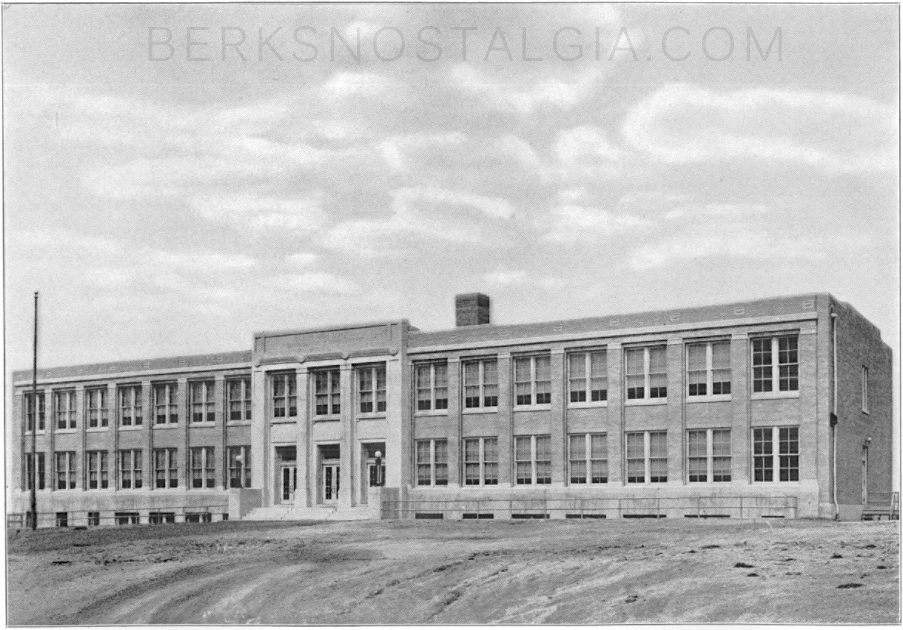
The original Wilson High School building was erected in 1929 on Grandview Boulevard above West Lawn. The first school year started in Fall 1929 and housed 7th-12th grades. The name of the school was chosen in the hope that the life of the man in whose honor it was named, Woodrow Wilson, might serve as an ideal for the young people attending it. According to the first Wilsonian,
The school seal itself symbolize the things Wilson stood for – the book for the gaining of knowledge, and the lamp for the interpretation and application of it to the world’s problems.
1930 Wilsonian
A little known fact is that another location was also considered for the placement of the new high school building in 1929. The tract of land at Reading Boulevard and West Wyomissing Boulevard in West Wyomissing was the other proposed spot for the site of the high school. While the Reading Boulevard location was slightly more centrally located within Spring Township at that time, the site on the verdant hilltop looking over West Lawn was deemed to be the better choice.
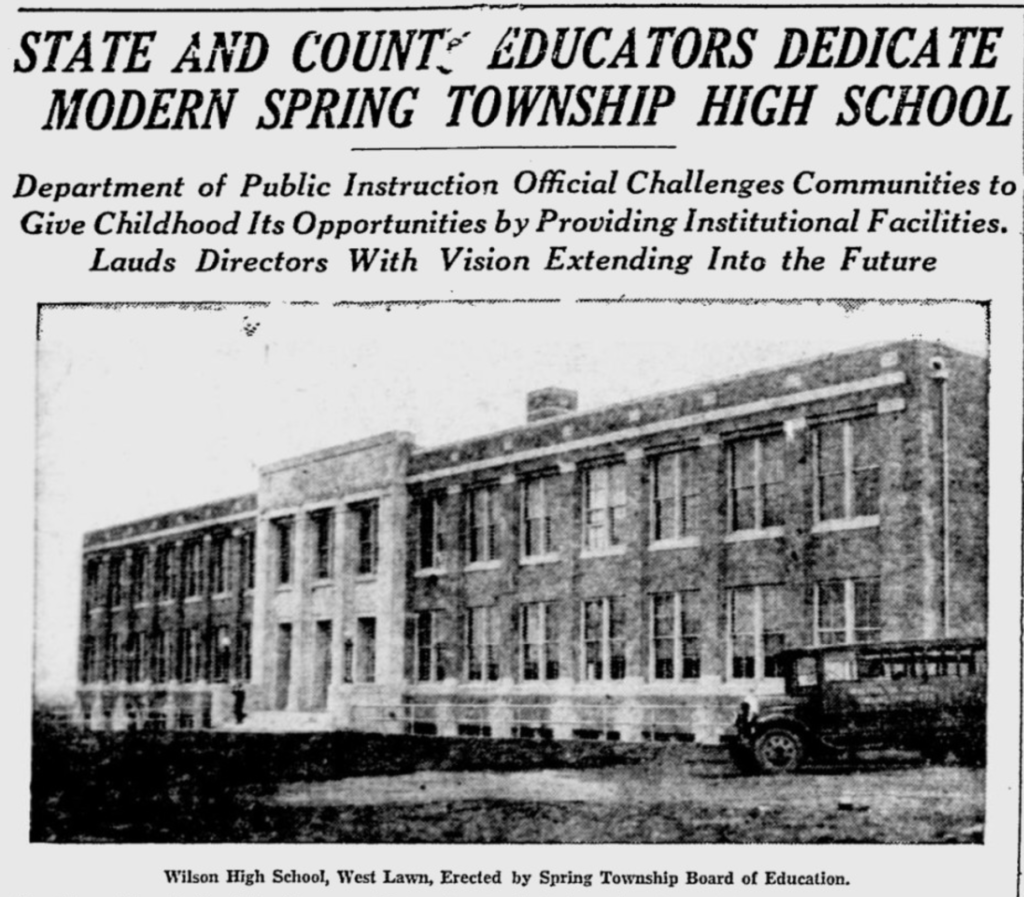
The high school was dedicated with an impressive ceremony on Thursday, November 14, 1929. The growth of the education system in Spring Township was typical in rural schools during this period in eastern Pennsylvania. When Spring Township was separated from Cumru in 1850, there was no organized school system. By 1854 there were fourteen free schools each with an average enrollment of about forty-six students. The school-term at that time was roughly four months long.
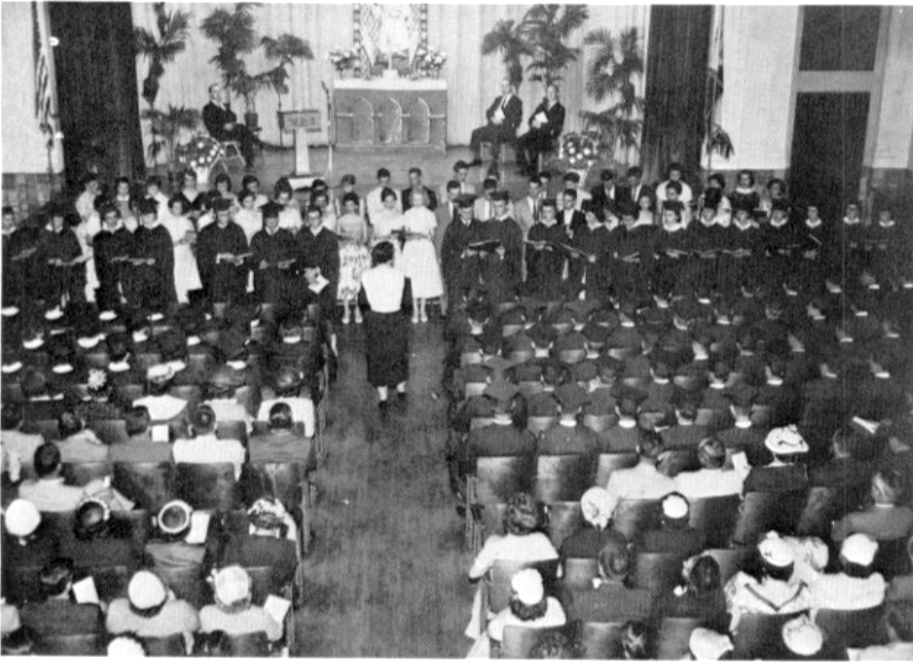
The beginning of the twentieth century saw fifteen schools in the township; but the modernization period began at this time and many of these small schools were closed, their students being enrolled in larger and more up-to-date buildings. In 1910 Van Reed’s School was eliminated; Gehman’s was closed in 1919; Steffy’s followed in 1927, and Kissinger’s in 1928.
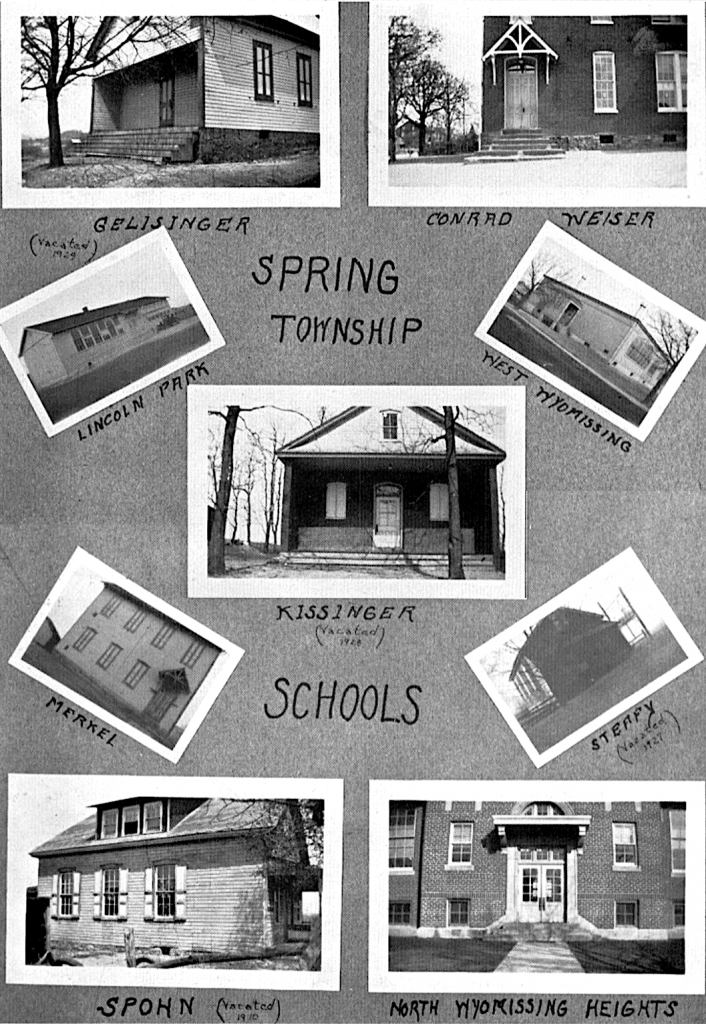
By 1928 the Township was shelling out $40,000 to send its youth to nearby schools outside the township to continue their secondary education. So they decided to plan and build their own institution. In 1929, Vinemont, Artz’s, and Gelsinger’s schools were closed due to the new Wilson High School being built. The elementary schools that remained and served students grades 1-6 were West Lawn, West Wyomissing, North Wyomissing Heights (later known as Berkshire Heights), Lincoln Park, Conrad Weiser (located on Fritztown Road, unrelated to today’s district), and Merkel. Many generations of Wilson students continued to attend these elementary schools until the very last of them, West Wyomissing and Lincoln Park closed in 2012.
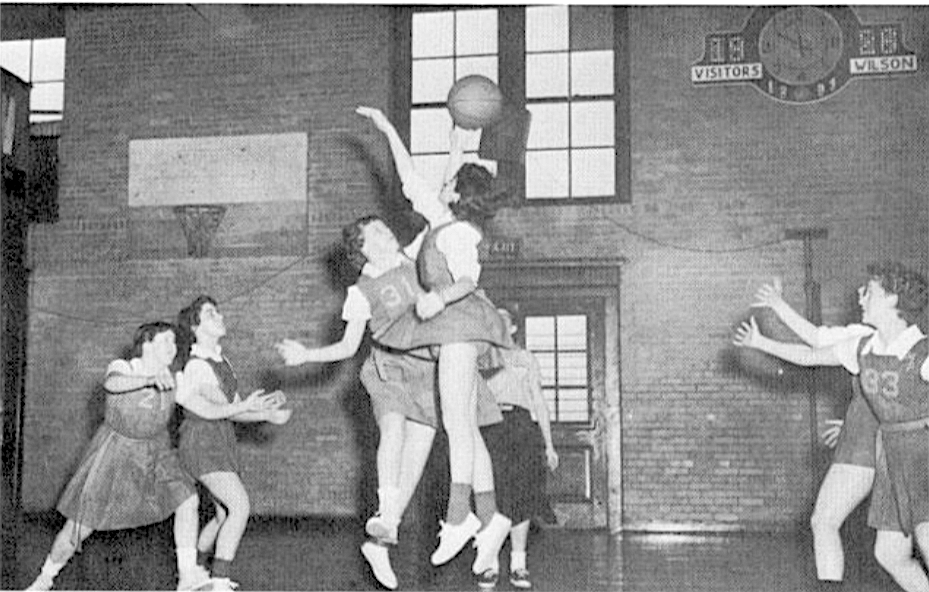
The Prexies
Wilson had two sports out of the gate; only Boys Basketball and Boys Track were offered that first year. The only other two activities were Glee Club and Band. The next year sports were expanded upon to include a Boys Baseball team and a Girls Basketball team. By the end of the school’s first decade sports included Boys Soccer, JV Basketball, Girls Track, Boys Swimming, Golf, Boys Tennis, and Ping-Pong. Cheerleading was introduced in 1933, and the first squad consisted of three boys; all named Bob.
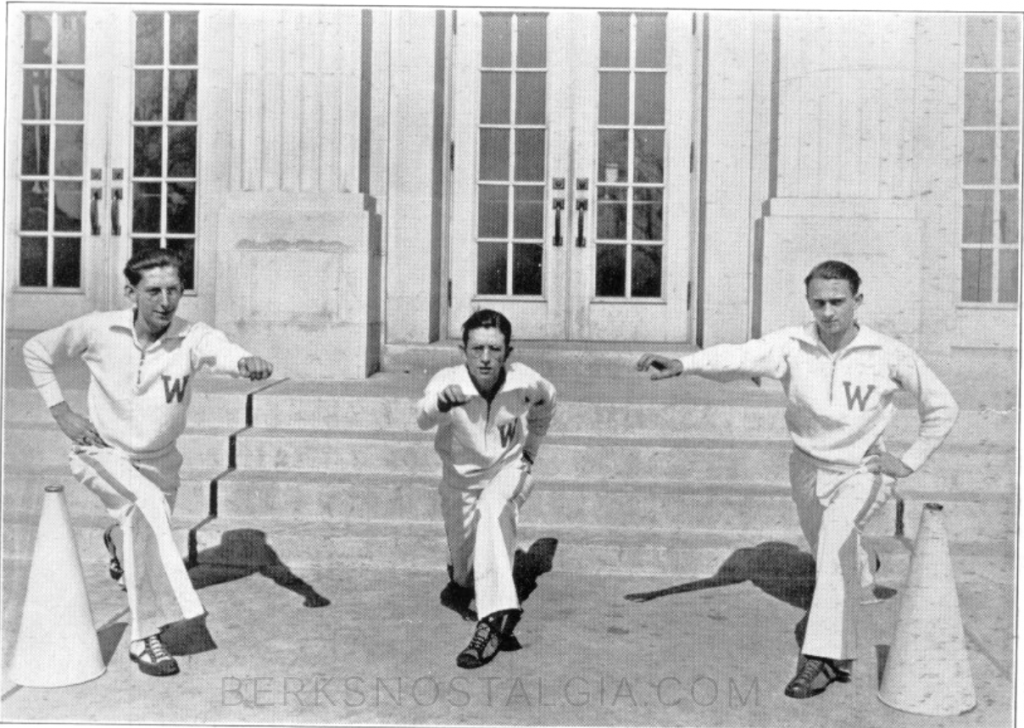
Boy’s Basketball would remain the “main sport” at Wilson for its first four decades. They won the Western Berks Divisional Championship for four straight years between 1935-1939, and regularly made it into the Berks playoff games. The varying success continued on for the entirety of the school’s history.
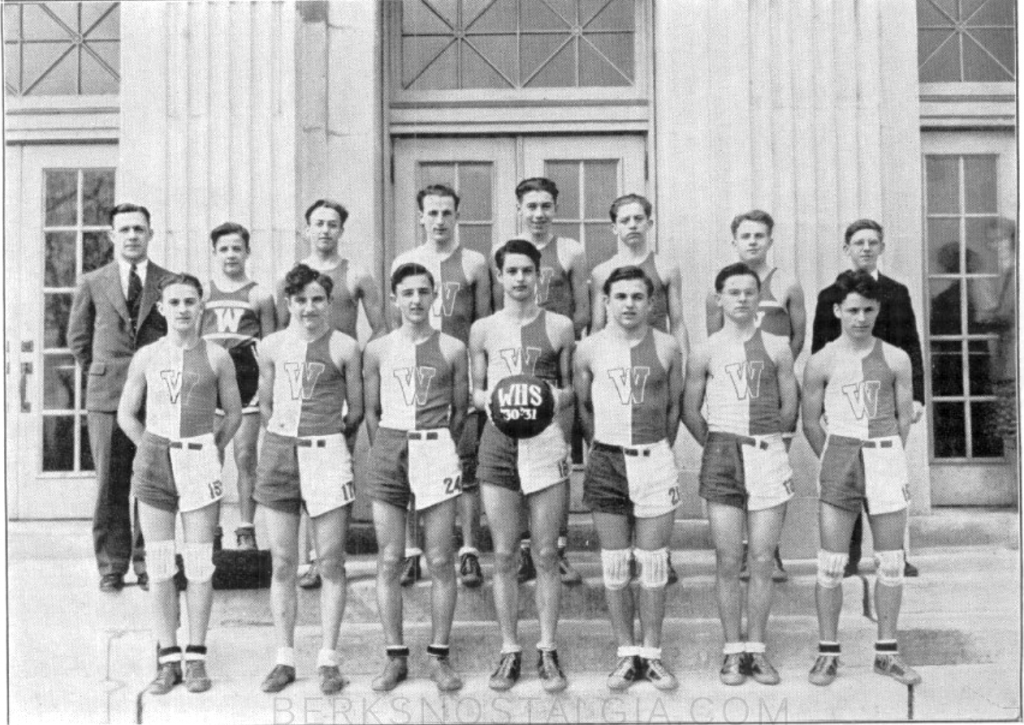
Beginning in 1936 Wilson’s sports teams began to refer to themselves as the Presidents, or Prexies for short. Prexies would serve as the term for the school mascot until 1960, when the Bulldog became the reigning icon. It is unclear why the Prexies nickname was dropped, it was certainly unique and provided a link to the school’s history of being named after a President. It appears 1960 was not the first time a bulldog had been utilized in school mascot material. In 1949 a “school culture” yearbook photo shows a book cover; a bulldog named “Mr. Prexie” looking tough and rugged. If you know the answer to why Prexies was abandoned and when the Bulldog was introduced, feel free to drop a comment.
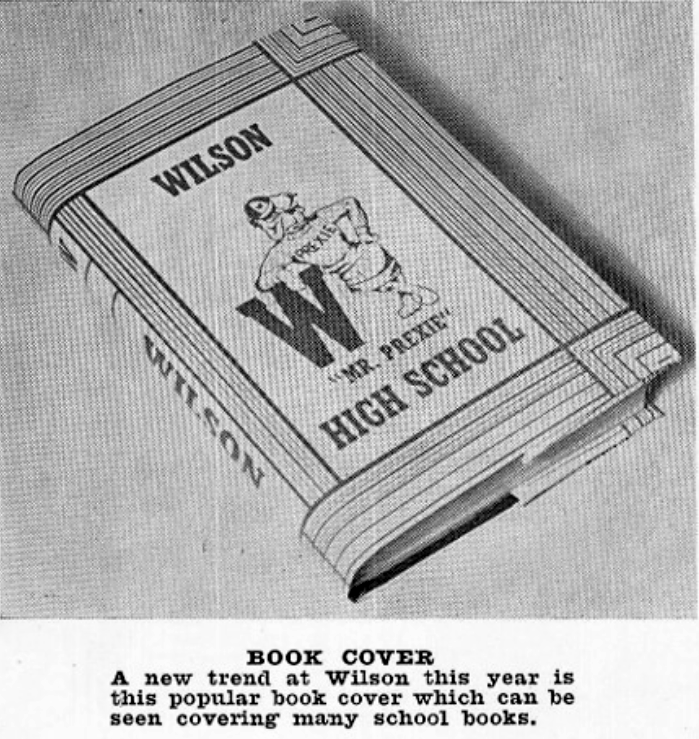
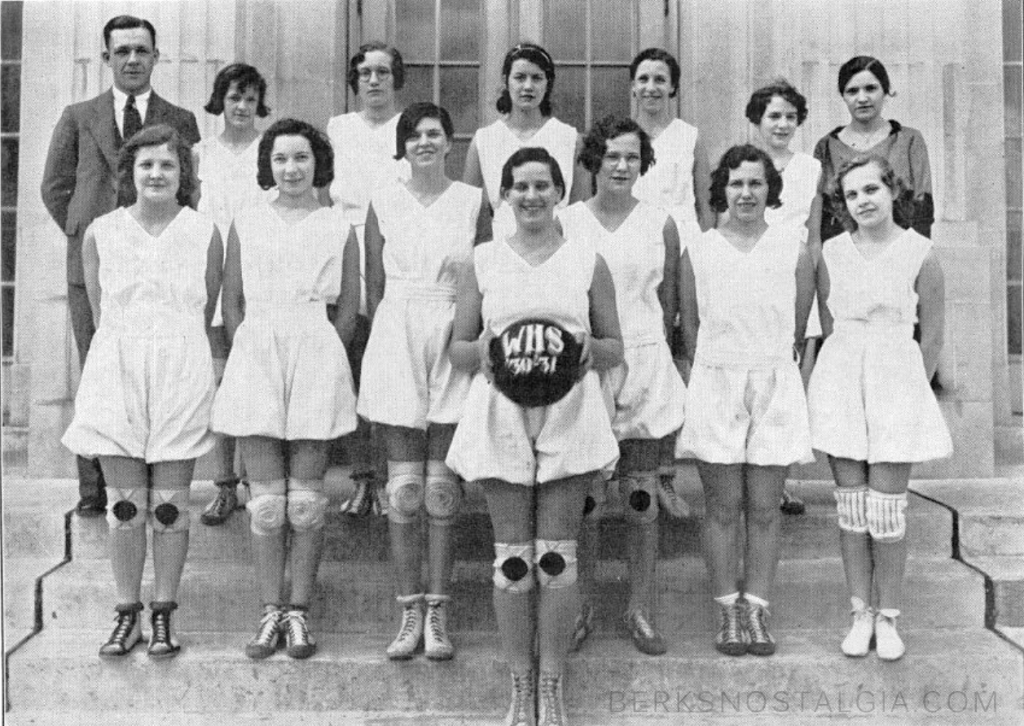
Mounted on the verdant hilltop,
School Song – Alma Mater – Written by Mrs. Grace D. Alsberge, West Lawn Elementary Teacher
Looking o’er the town,
Proudly stands our High School building,
as the sun goes down.
Wilson High School, Wilson High School!
Sing with all your might,
We will rally round the standard,
of the Red and White!
Continuing to Change & Grow
Everyone knows that Wilson High’s school colors are Red and White. What you likely do not know is from the founding of the institution in 1929 until about 1933 their colors were Blue and White. The Alma Mater song was amended in 1935 to include “red” in “blue’s” place. It is unknown why the color was changed.
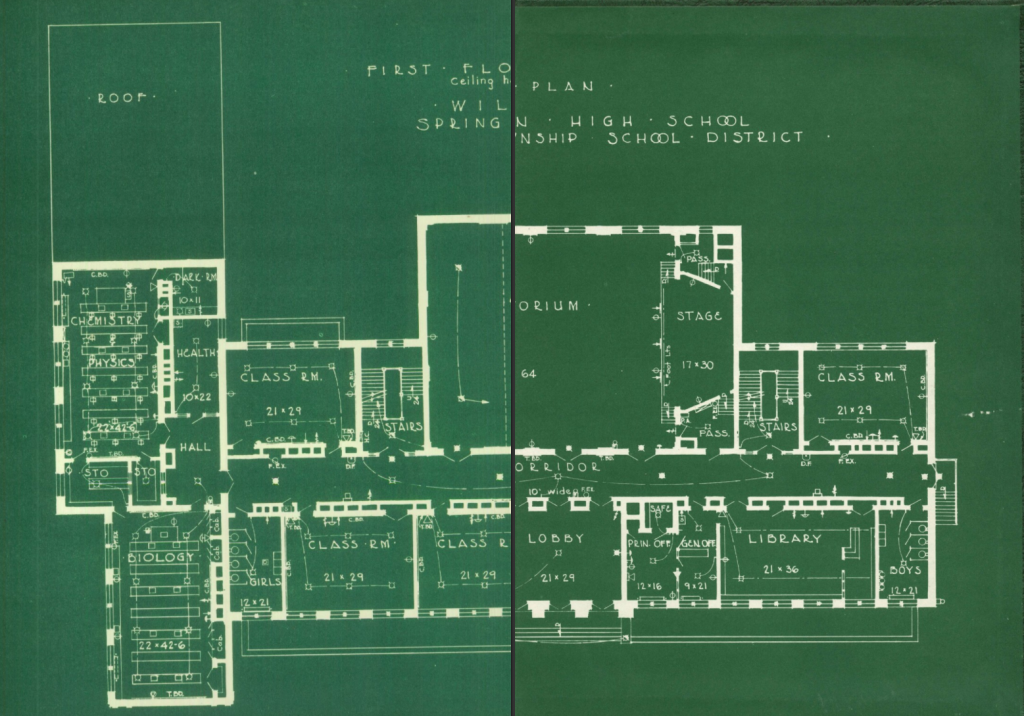
Also in 1936 an addition was added to the original building. Six new classrooms were established including science labs and shop space. The enrollment was increasing in the mid-30s, mainly due to prospective changes in Child Labor Laws. This meant since children were not able to work, or had to work less, they had the opportunity to attend school longer.
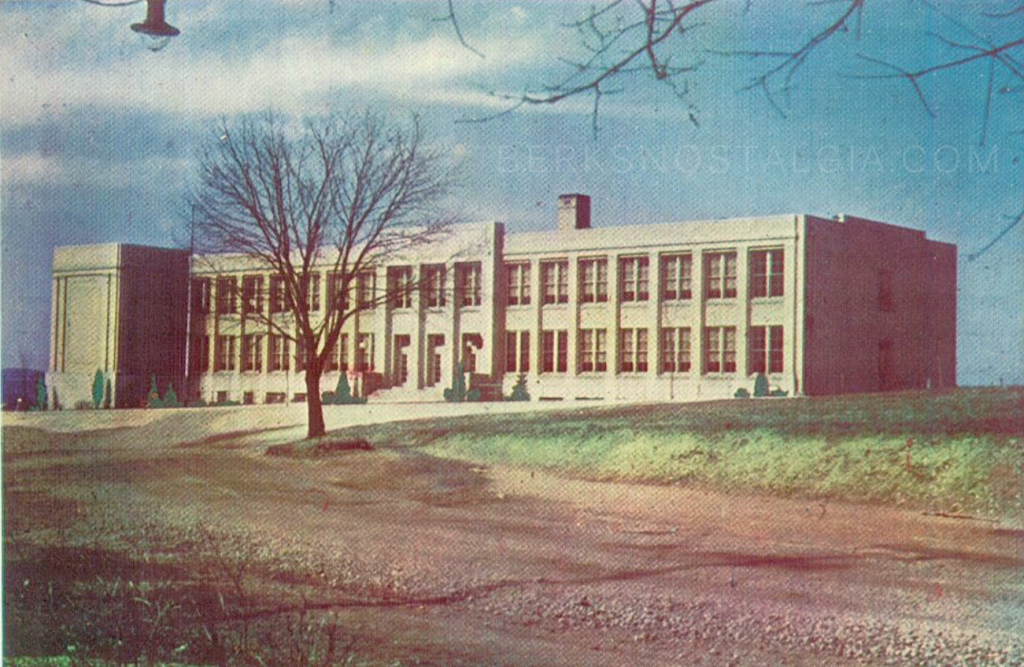
The Wilson High School Football Story
The 1940s saw more advancements for the still fairly knew institution. Wilson is now known widely for its successful football program, but Football as an extracurricular was not introduced to Wilson until the 1945-1946 school year. They played 5 games in that inaugural year in what was more exhibition than actual league play. They went 1-4; beating Reading Jayvees squad 7-0 in their first game, and losing the remaining to Manheim, Wyomissing, Coplay, and Muhlenberg by no less than 14 points each game.
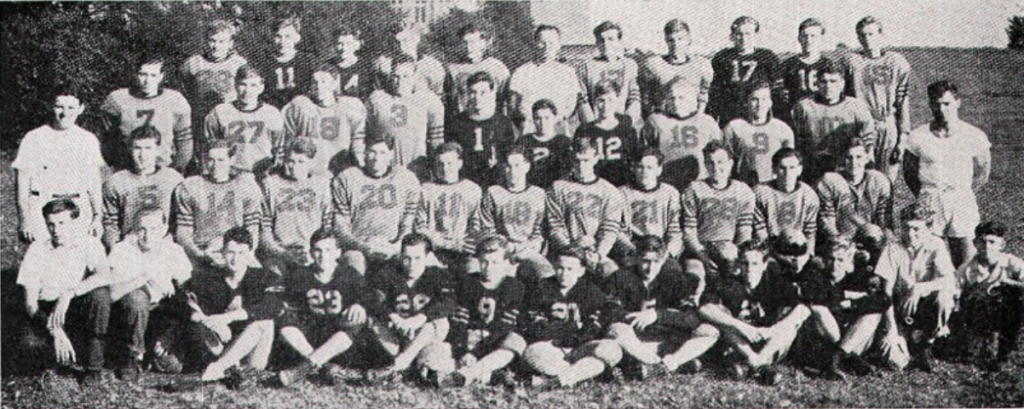
The next year in Fall 1946, the Prexie Football team entered the Berks Conference for their first league season. They played 9 total games, 6 of which were inter-league games. They played Manheim Township, Coplay, Reading Jayvees, West Reading*, Shillington*, Wyomissing*, Boyertown*, Muhlenberg* and a Berks Conference playoff game*. Asterisks denote the league games. They went 4-3-1 total and 3-2 inter-league and placed third in the league in the 1946 year.
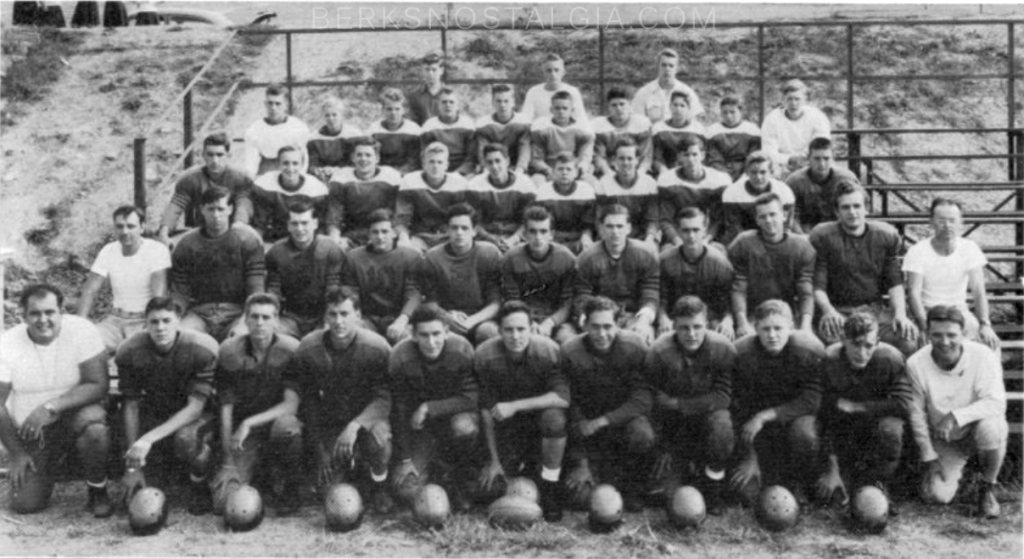
Wilson’s football program would remain mediocre to bad (except 1959 when they went 8-1-1*) for the entire 1950s and early 60s until the program as we know it was established in 1964 under John J. Gurski. His first season as head coach the team went 5-5, which believe it or not was an improvement. He remained the head coach at Wilson until 1982 and during his tenure turned Wilson into the football powerhouse it remains today. He ended his coaching career with a record of 151-44-4 which was the most winningest record for a coach in Berks at the time of his retirement. Wilson celebrated its 75th football season in 2019.
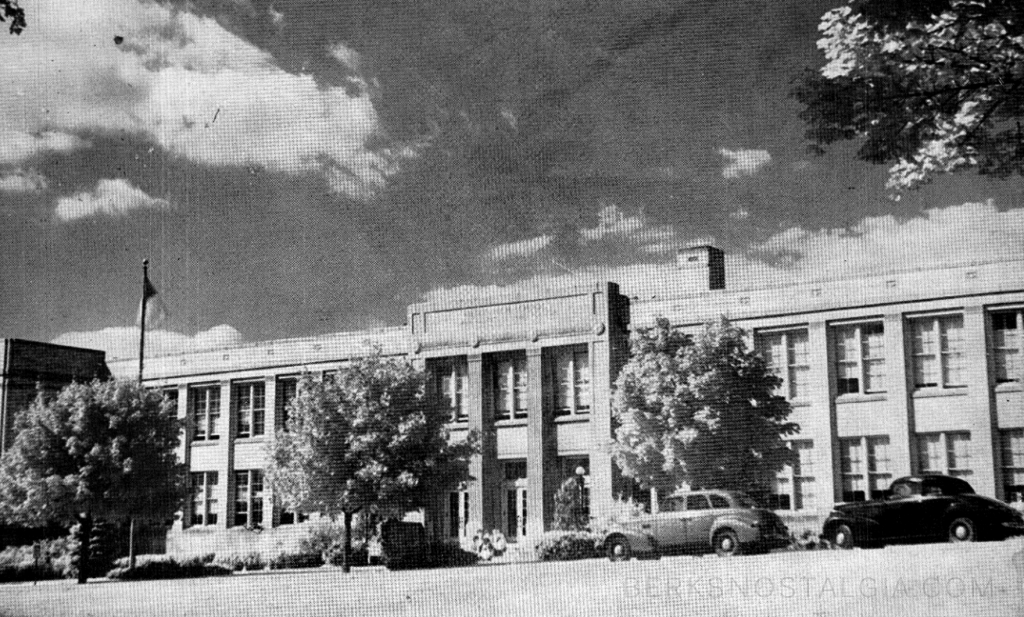
Wilson High School’s 1960 Addition
The 1950s saw an influx of enrollment at Wilson High. Due to the merger with Sinking Spring High School in 1954 Wilson started reaching max capacity for the then-25 year old building. The School Board knew that a considerable addition needed to be made in order to keep up. In 1958 the planning began and in 1959 construction followed.
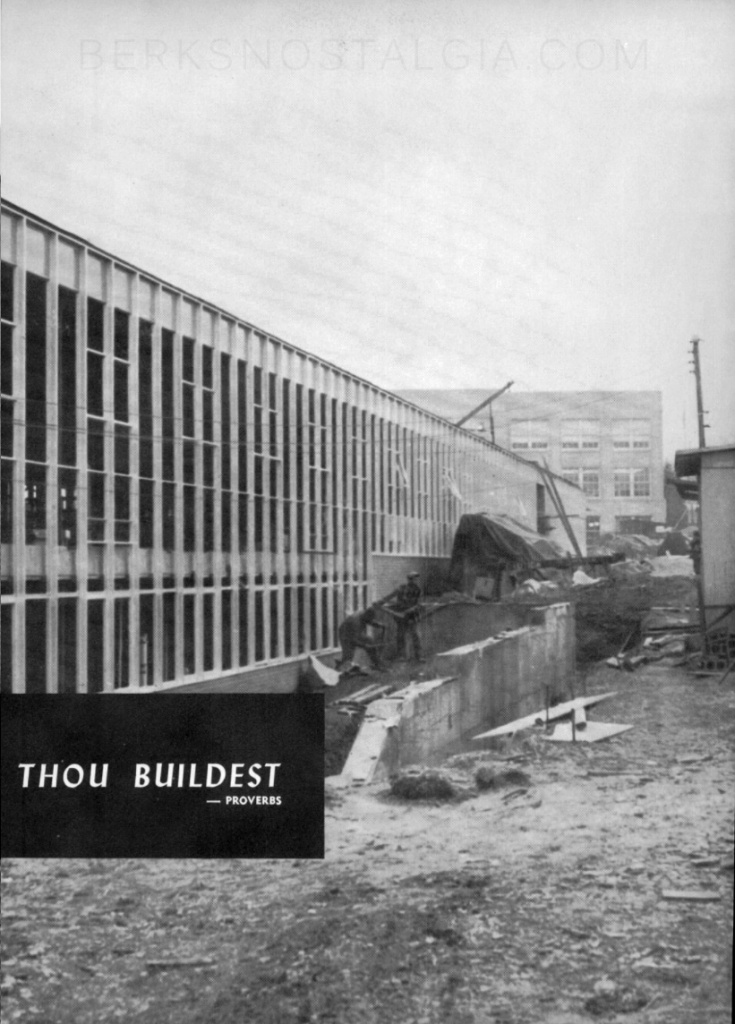
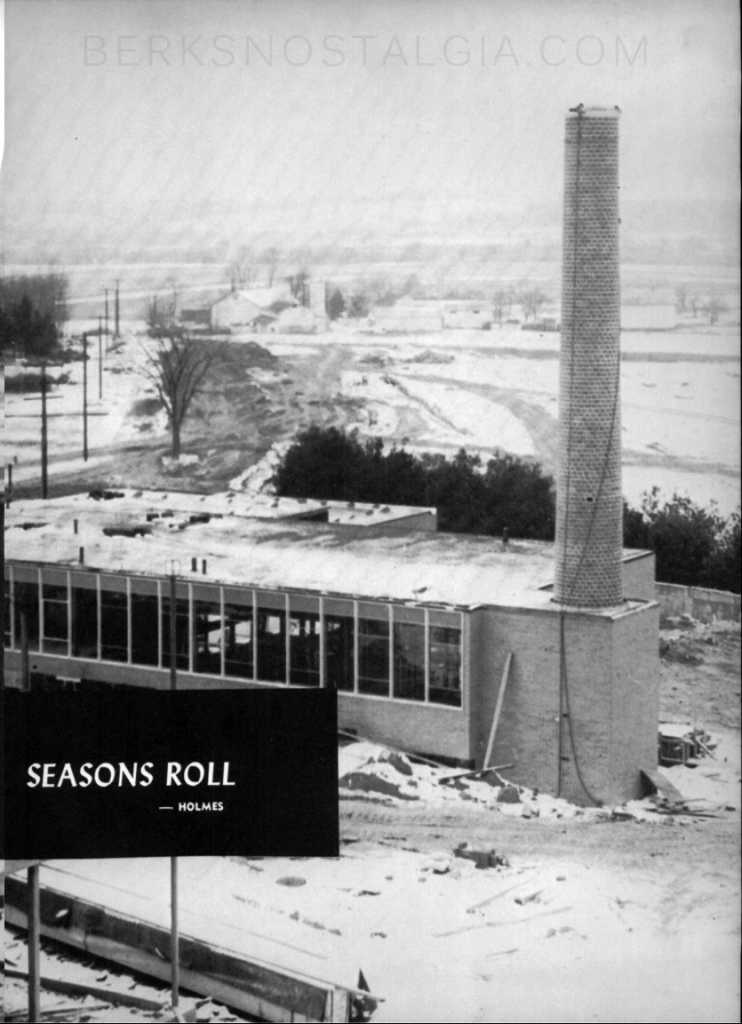
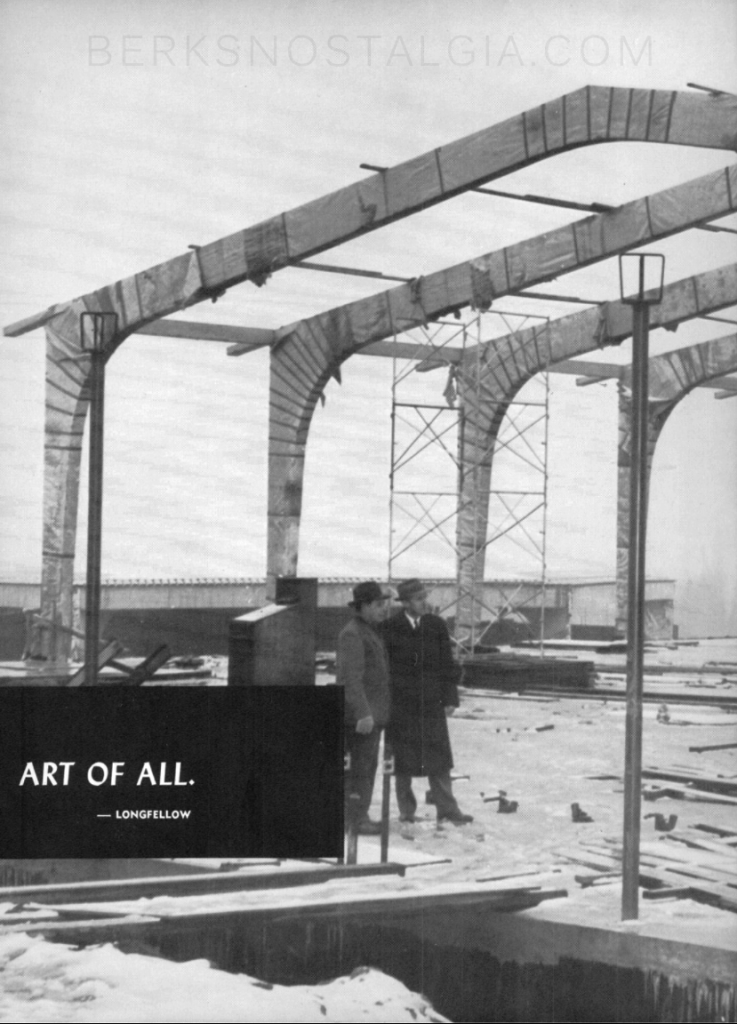
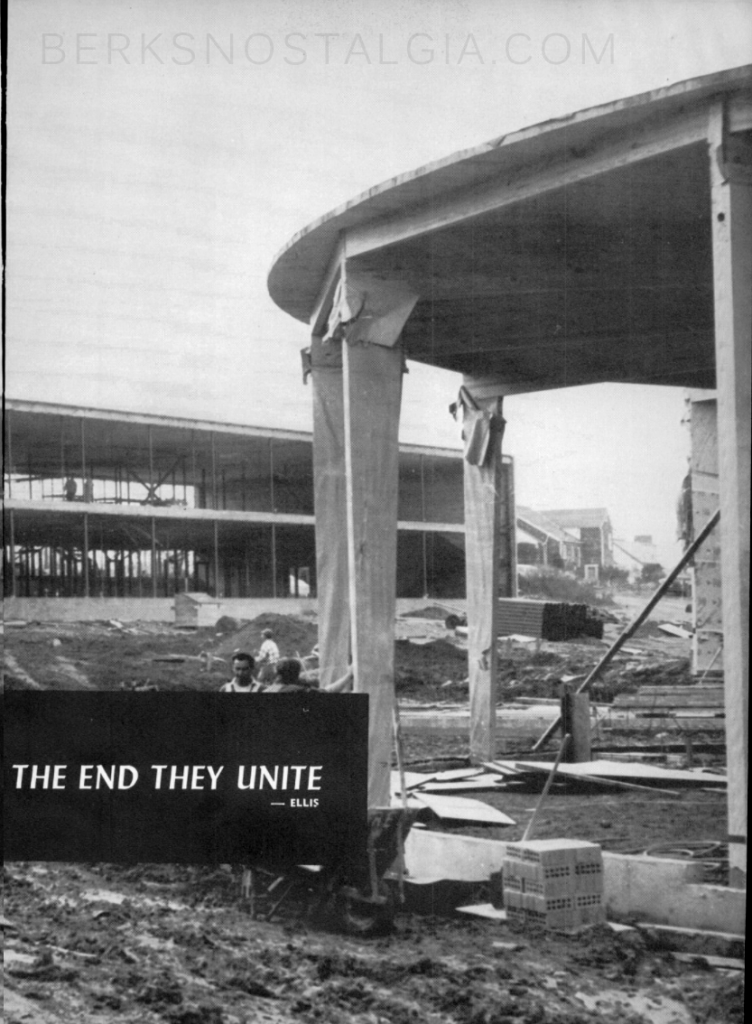
New additions included a hexagonal auditorium, a circular building housing a music room and radio transmission center, a new wing with two stories of classrooms paralleling Grandview Boulevard, next to a new gymnasium and directly below it a new cafeteria. Other upgrades included a new vocational agriculture area, a garage for bus repairs, and a driver training program. All of these additions cost a total of $5 million.
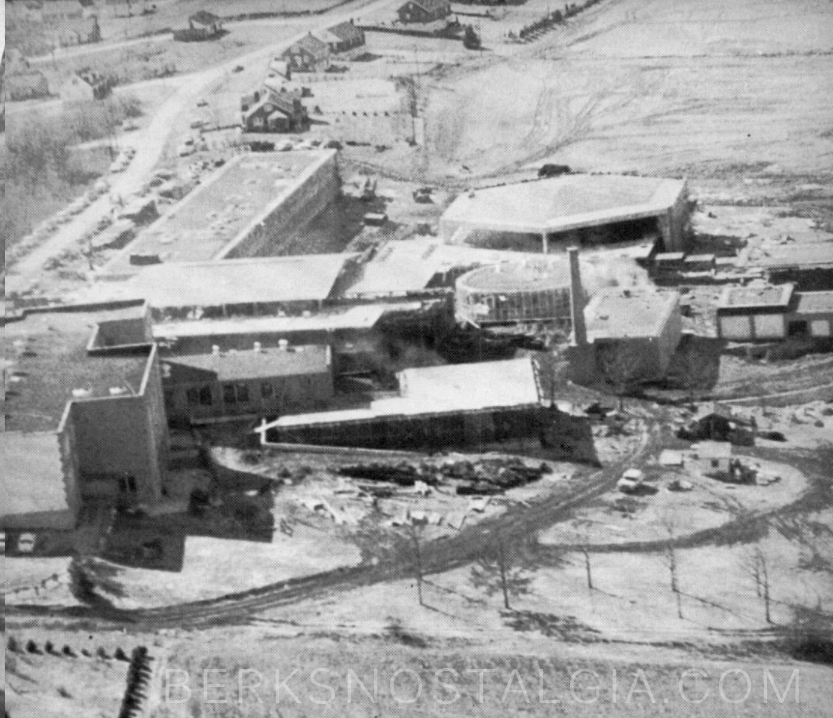
The new additions were completed in 1959, and opened its doors to the students in the 1959-1960 school year. For the first time in the school’s history the Junior High students would be separate from the high school students. The 9th-12th graders occupied the new buildings and the 7th & 8th graders stayed behind in the original building. This was only for a short time; Wilson Junior High was constructed right behind the high school in 1964.
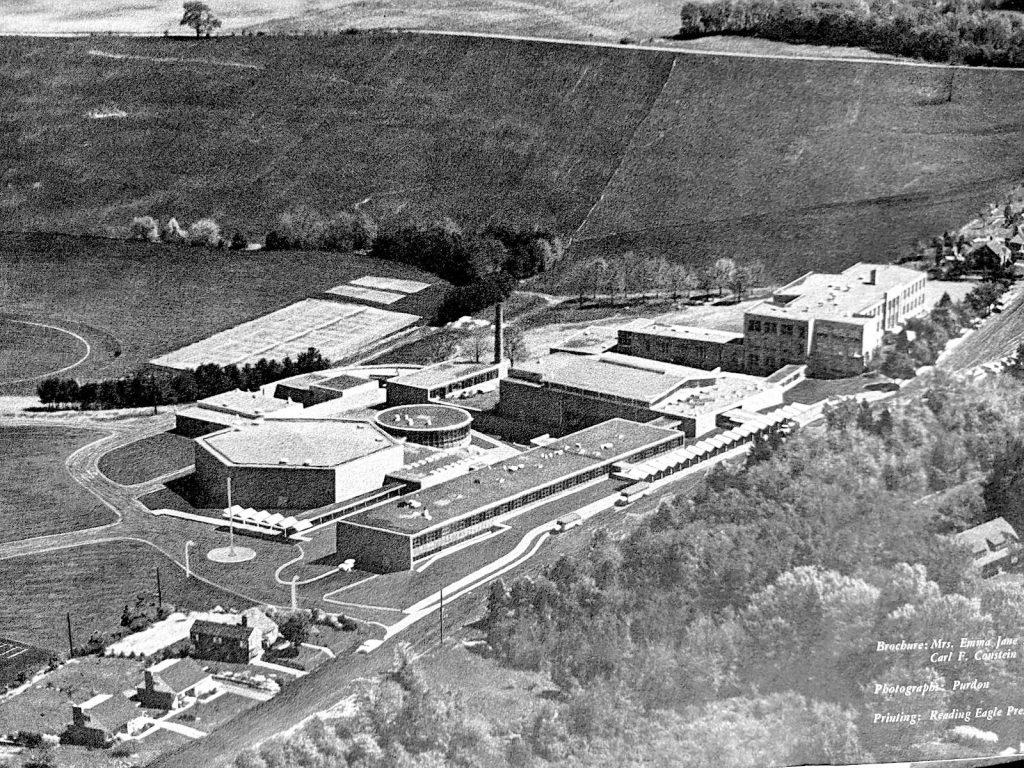
With the construction of the Junior High brought a first for any school in Berks County – an in-school swimming pool, or natatorium. Before this school swim teams practiced and had meets at local YMCA’s. The new school and pool were built for $2.29 million and had the capacity for 575 pupils. The district was growing quickly.
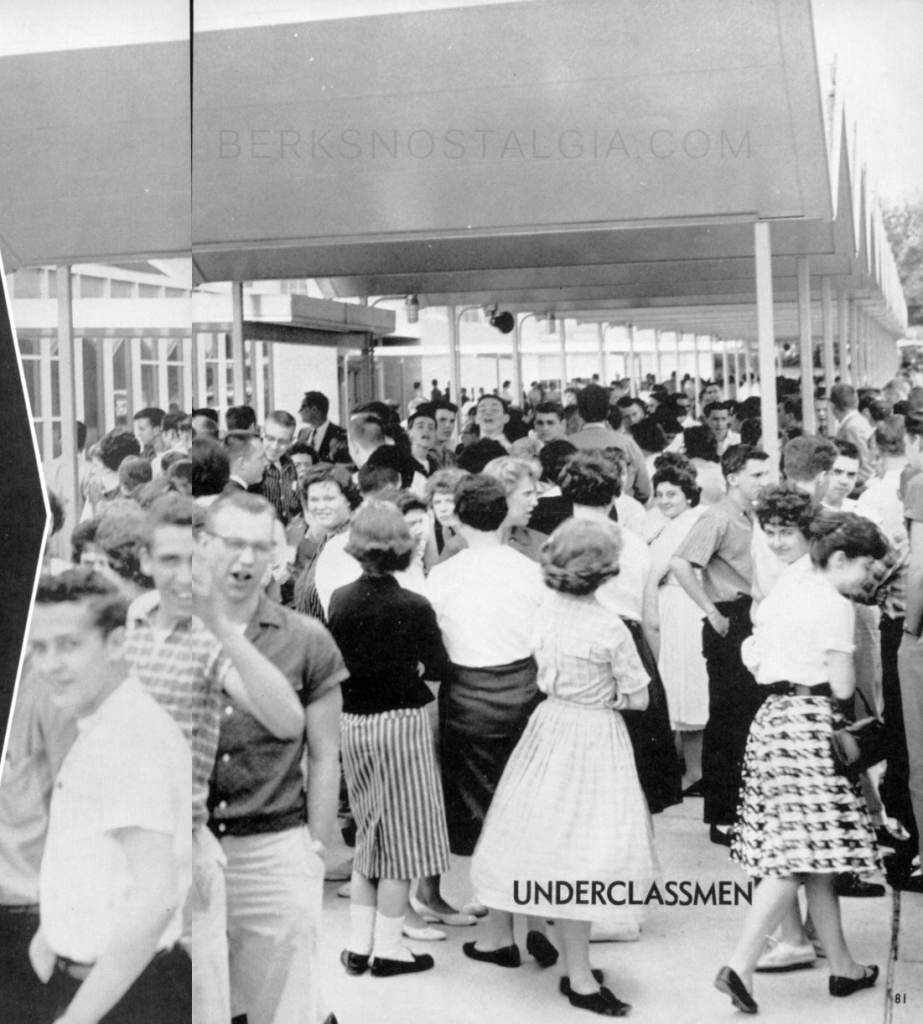
Within 10 years the district needed to expand yet again. In 1974 the district built and opened another 600 pupil capacity Junior High School on land between Spohn Road and Iroquois Ave in the southern part of the district. The school was named Wilson Southern Junior High, and after its opening the then 10-year-old Junior High behind the High School became Wilson Central Junior High. At this time 9th graders were bumped down to the Jr. High with 7th & 8th graders. The High School housed 10th-12th. The entire cost of the new school was $6.1 million, but that also included the connected elementary school, Cornwall Terrace.
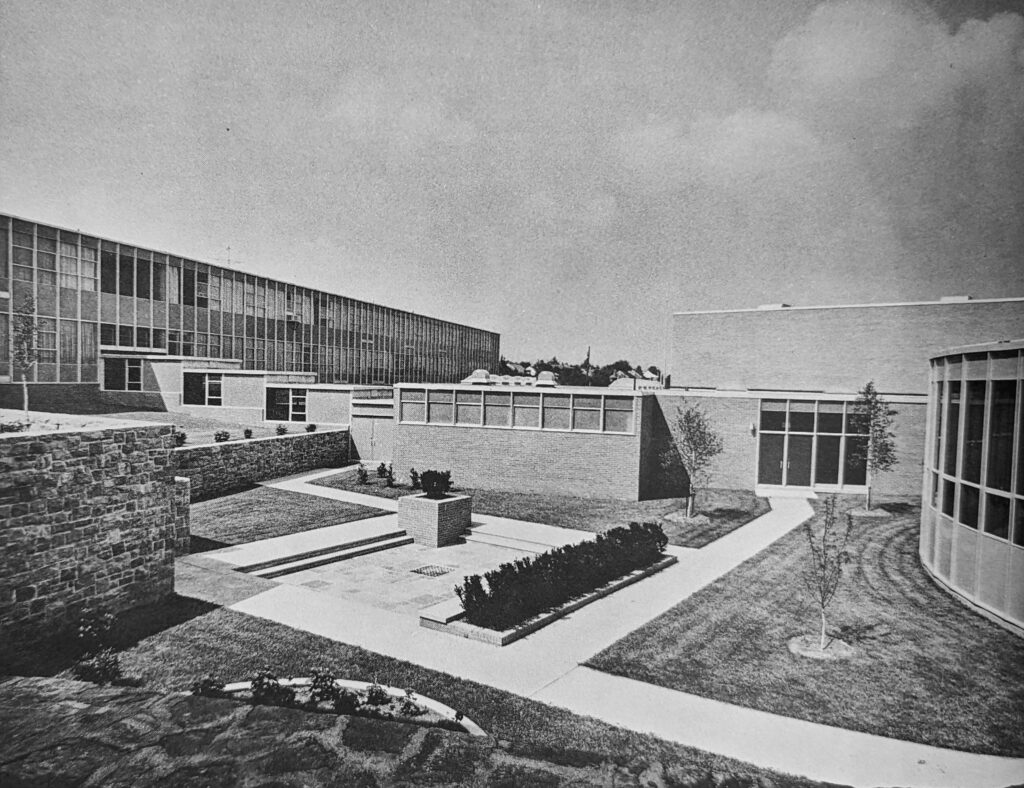
A Brief History of Pre-2000 Elementary Buildings
Berkshire Heights
Originally called North Wyomissing Heights, it is the oldest elementary school still in use by the district. In 1907 the two and a half brick structure was completed for $25k and housed eight classrooms. In 1929 an addition of classrooms was added. In 1966 another addition occurred. The building is still functioning today as an Early Learning Center for the district. There was a bit of drama surrounding this area in the 1950s, as the North Wyomissing Heights Area was originally incorporated with Wyomissing Borough but then annexed. The rumor was that Wyomissing didn’t want the Heights students. This didn’t seem to be the case since it appears Wyomissing fought for them, but a judge ruled that Wilson would continue to maintain the area since they owned the property and had already been serving the community for decades. Just a decade ago in 2009 the issue came up again, and again it was ruled that Berkshire Heights was to remain a part of the Wilson School District indefinitely.
Lincoln Park
The Lincoln Park Elementary that people alive today remember was built in 1948. There was a school building at the beginning of this article pictured in 1930; that building was outgrown and razed. Lincoln Park served its community until 2012, when the district announced it would save $500k a year by closing it. It was razed shortly after and is an empty lot save for playground facilities and ball fields. Wilson SD still owns the property and has potential future plans for a new school building on its site.
West Wyomissing
West Wyo was built in 1936 with federal grants. Similar to Lincoln Park, there was a school on the site previous to the one built ’36, but it was outgrown. An addition was added to the West Wyo building in 1961, which included a Cafeteria, kitchen, music rooms, health and guidance rooms and new restrooms. It served the community until 2012, when the district announced it would save $500k a year by closing it. It was razed shortly after and is an empty lot save for playground facilities.
Lower Heidelberg
Lower Heidelberg was constructed in 1931 on the corner of Brownsville and North Church Roads and had nine classrooms. Lower Heidelberg underwent renovations in 1966. It was closed by the district in 2006 and the pupils moved to the then-newly constructed Green Valley Elementary.
Sinking Spring
Pre-1954 history has been detailed in this article. After Sinking Spring merged with Wilson to create the Wilson Joint School System, the Sinking Spring building began use as an elementary building. The school underwent some renovations in 1964, including new windows, insulation and new hot water heating system. Sinky was closed down by the district in 2000, and sat vacant until it was converted into apartments in 2004. Pupils from the school were dispersed between Cornwall Terrace and the then-newly built Shiloh Hills Elementary.
Cornwall Terrace
Cornwall was built in 1974 along with the connecting Southern Jr. High. It underwent an addition in 1991 that included a gymnasium, rest rooms, vocal music room, early childhood area, resource activity rooms and a lobby, physical education office and three storage rooms. Cornwall had another addition completed in the late 2000s that cost $12.2 million.
Whitfield
Whitfield Elementary was originally a 28 classroom school built in 1962 at the cost of $960k with a capacity for 700 students. It was by far the largest elementary building in the district built at that time. An addition in 1969 added 8 classrooms. In 1991 it was again renovated with the additions of a gymnasium, phys ed. office, a large library and a computer rooms. Also added were child care services and television room.
Conrad Weiser
Conrad Weiser School was located on Fritztown Road and served the community of Fritztown and the surrounding area. In May of 1966 the school board was advised by the State Secretary of the industrial board that they could no longer use the second floor of the building. I am unsure if this was due to structural issues or other safety hazards. The building remains today and has housed various business and restaurants since the school’s closure at the end of the 1970-1971 school year.
West Lawn
West Lawn Elementary was built in 1904 and a 6 classroom addition was added in 1923. The school was razed in 1977 and a park remains on the site today. The bell that was in the tower of the West Lawn Elementary building was placed in Spring Ridge Elementary School’s cupola upon its completion in September of 1995.
Wilson High School Additions in the 1990s and changes into the 2010s
Wilson remained largely the same for over three decades until increased enrollment again called for expansion. In 1996 ground was broken for a new, state-of-the-art gymnasium to be built behind the auditorium. The old gymnasium was converted into the library. An entire new three-story wing was built in the courtyard that was between the old Library/Cafeteria building and the auditorium lobby. The circular music classroom was demolished as a result of that wing being built.
Sports fields have also been heavily upgraded at various times over the decades, most recently upgrading John Gurski Stadium to the tune of $4 million in the early 2010s. A new Jr. High School, Wilson West, was also completed in 2010, which shuttered Wilson Central as a Jr. High School. At this time, the Central building became a part of the High School and after almost 40 years 9th graders were again part of the High School student body. Southern and the new West were deemed “Middle Schools” and now house 6th-8th graders.
Future Plans
Shortly after new year 2020 the Wilson School Board unveiled that a future population growth study predicted a large increase in enrollment within 5-10 years. They presented quite a few proposed plans on changes that would need to be made within the district, all pretty drastic and costing up to $120 million. Some plans include gutting the Wilson Southern Middle School building along with Cornwall Terrace and making them one cohesive Middle School. Another includes building a new Elementary on the site of the old Lincoln Park School. All plans include considerable additions to the current High School building. View these plans here, and be sure to tell the school board how you feel about them if you are a Spring Township resident.
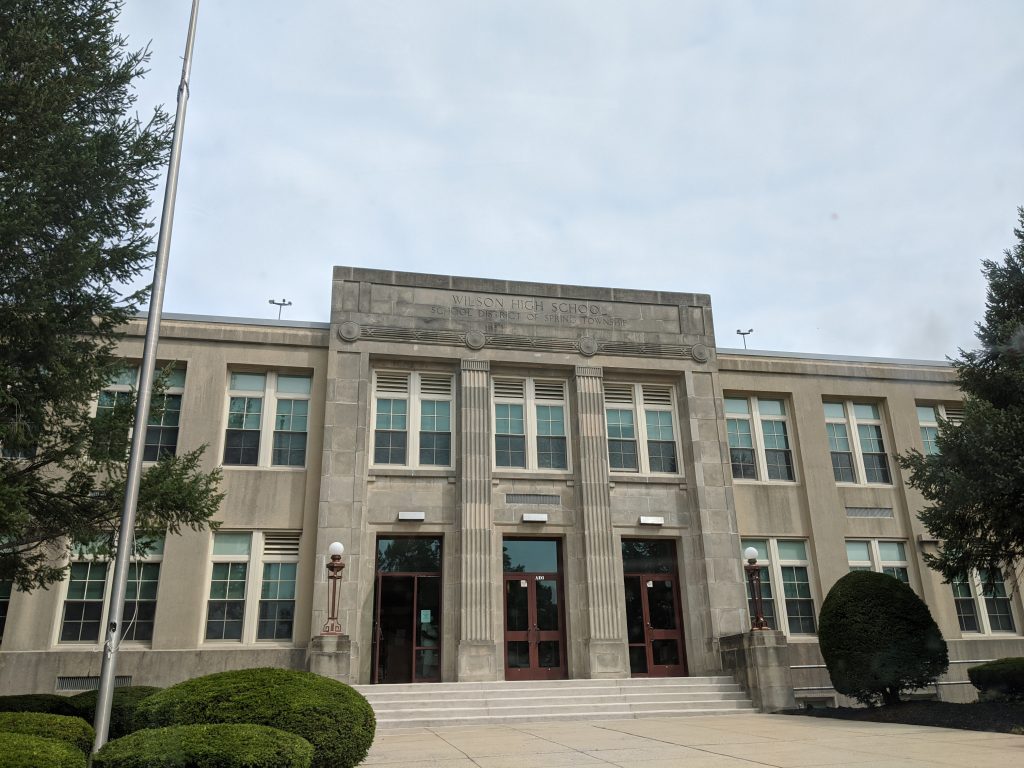
Source: Reading Eagle, Wilson School History by Alan K. Raffauf, Various Wilsonian Yearbooks
Shop Wilson High School Vintage Apparel
SHOP BERKS NOSTALGIA’S DEFUNCT SCHOOL COLLECTION
This article is dedicated to my graduating class, Wilson Class of 2009, my Mother’s class, Wilson Class of 1978, and Grandmother’s class, Wilson Class of 1960.

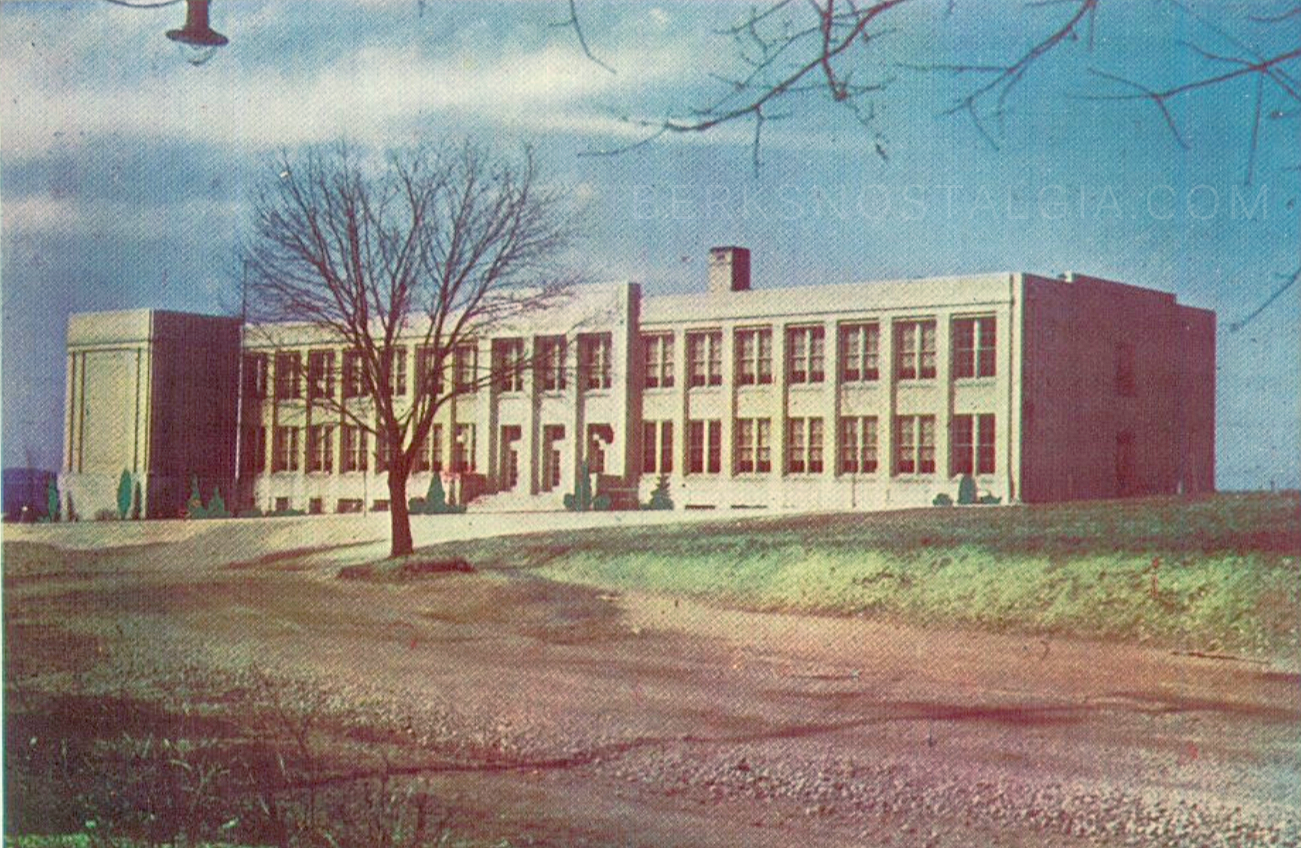



Football-you mention that football was mediocre to bad in the early ’60’s. I was a member of the 1960 team that went 8-1-1. tisk, tisk.
Greg Allushuski
Oops! Very sorry Greg. I have added that info to the article… Do forgive me 😁
Where was the Steffy school located. My family is from the Montllo area. Randy Steffy
The Steffy family owned property along Bern Rd. which is now State Hill Rd. in Spring township. Into the 70’s there was still Steffy’s garage/gas station along State Hill Rd. near broadcasting with old Mr. Steffy pumping gas, chatting and selling soft drinks.
Hey Randy,
Alan Raffauf’s book places Steffy’s Schoolhouse on Bern Road near the intersection of Broadcasting Road…however I cannot find a Bern Road in Spring Township, so the name has likely changed. Perhaps it was on what is now a stretch of Paper Mill Road? Definitely not near Montello, though. The closest school houses to Montello would have been Conrad Weiser and Merkel.
My brother went to the conrad weiser school for grade school. It is just down the fritztown rd. from Montello.
As I remember, Bern Rd started in Wyomissing behind the post office and ran through a tunnel under the railroad tracks and all the way out to the village of State Hill and over the hill into the valley that is now Blue Marsh Lake. I’m not sure when that became State Hill Road.
As Jan Gyomber posted, most of what is now called State Hill rd. was definitely named Bern rd. At least from Penn Ave., Wyomissing, across the Spring twp. line and to Van Reed rd. It may have been State Hill rd. from that point to the village of State Hill. I wonder why it was ever changed? Joel Steffy’s incomparable garage and gas station had a Bern Rd, Wyomissing address, although it was barely in Spring twp. A sort of fun fact is that the nearby former Wyomissing dump was not covered for years. It was located just off of Bern rd on the unpaved road called Kissinger lane. Now covered by offices and medical arts buildings.
Thank you, Alexa. This is a very interesting piece.
I am pretty positive lower Heidelberg elementary was closed in 1995 when spring ridge elementary was built, same time Berkshire heights was closed, i my self went to Berkshire heights until 2nd grade and I have friends that went to lower Heidelberg and started at spring ridge once opened. I love this article tho! Thank you! I also believe wyomissing did not want the berkshire heights area until after the mall was built. Wilson owned all that land. But growing up in berkshire heights might have been why im biased on that one!
The reference I found about Lower Heidelberg closing was this article about Green Valley opening: http://www2.readingeagle.com/article.aspx?id=40656
Perhaps there was a redistricting in 95 that sent some of those kids to make a student body for the new Spring Ridge?
Glad you enjoyed the article! 🙂
In 1950 the courts approved the annexation of 1,000 acres of Spring Township by the borough of Wyomissing including the village of Berkshire Heights. The residents of that area were not all in favor of having their kids (attending Berkshire Heights Elementary and Wilson High) change schools. It was said that Wyomissing was happy to not have to absorb those students and a deal was worked out for the students to stay in the Wilson district and Wyomissing give financial help to Wilson. I believe that deal continues as long as Wilson continues to use the Berkshire Heights building, which is why it is the last of the old schools still being used. The prevailing wisdom at the time said that the rich folks of Wyomissing knew about highway development plans, and recognized the commercial value of what was mostly farmland. Essentially they pulled a fast one over the “hick farmers” of Spring Township and have been reaping 50 years of tax income from that area without having to educate those children.
I am a 1955 graduate of Wilson! I started out at the West Lawn Grade School (of which I have a brick from the building), went to West Wyomissing Middle School for 7th grade and then onto Wilson High. My memories of all 3 schools, especially Grade School and Wilson will live on in my heart forever! Thank you Alexa for all of this!
Hi Georgia! So glad you enjoyed the article! That’s awesome that you have a brick from the West Lawn elementary school. It’s interesting that you remember 7th grade at West Wyomissing. I do remember reading that 7th grade was a part of West wyo for some kids at one time. I guess they had to move kids around depending on space and enrollment. Thanks for sharing your memories!
Georgia, I noticed your post. My mother, Beverly (Laumeister) Snyder graduated in ’54
(She went to West Lawn Grade Sch.1-6 & W. Wyo for 7th as well) Take care!
I was shown the picture of the Three Bobs about 40 years ago, by one of the Bobs. He was the late Robert H. Baerncopf and is on the right in the photo. Bob passed in 1984. I apologize if all details aren’t correct as this is all from memory. Bob’s family was from the Robesonia area. During WW2 Bob served in a Transportation Corps unit based at the Reading Airport. Bob them operated the Gulf service station on Penn Ave. in West Lawn. This station was where Pennsylvania Dermatology now sits at 2128-2130 Penn Ave. This station was later operated by Harold Huber (I knew him as well). Bob was also employed by the Wilson Joint School System as a manager of bus operations. Bob owned and operated the former West Lawn Radio & TV at 2511 Noble St. Bob is buried in St. John’s Cemetery on Hull St. in Sinking Spring.
WOW that is such interesting info Greg. Thanks for sharing it! I love that we can keep the memory of the great people of Wilson alive long after they are gone.
Alexa,This is great,did you get my reply? Otto Bitzer class of 55
Hey Otto, I’m not sure I have seen a previous response of yours… Did you email me or write a comment here? Feel free to get in touch via email: [email protected]
Alexa
Did you get the information I sent to you yesterday about the class of first graders of 1943. It was in Lincoln Park and we had a class at three and are still living. Second grade with 12 people third grade boys eight people. They only used it for three grades.
I did not get it! I would love to hear your memories though!
Alexa. What an article. I really enjoyed learning about the history of Wilson. I graduated in 1980 from Wilson. I attended Whitfield elementary and Central junior high. My first year at central was the first year of southern junior high opening. I was lucky my parents moved into the wilson district. Great memories for me. Again thanks for writing this
Hey David, you are very welcome. I had a blast putting it all together! My mom got shipped over to Southern to be a part of the first 9th grade class in it. She recalls not being very happy about it at the time since the rest of her friends stayed at Central but at least it was only a year.
Alexa, Reference Steffy’s school. Bern road is now State Hill road.
Thanks Dennis! I knew it had to be State Hill or Paper Mill
Very nice and informative compilation. Thank-you for presenting this chunk of Wilson history. I’m a ’66 grad – went to West Wyo for elementary. I believe that 8-1-1 football team was actually the 1959 season.
Glad you enjoyed it Scott! You are correct, it was the 1959-1960 school year and was in the 1960 yearbook but the football season would have been fall ’59
Being a 96 grad I thank you very much for writing this, it has lots of information I didn’t know. The old score clock in one of the pictures is in the gym today which is pretty cool. I believe they brought it over from Sinking Spring Elementary School.
The Sinking Spring scoreboard did look very similar to the one in the picture, but it couldn’t be the same one as in the picture. Both buildings were high schools at the same time. Does anyone know for sure where the scoreboard in the new gym came from?
The thing about the Wilson High Scool building, is the building had a lot of breezeway’s. The breezeway’s were the hallways that connected the different buildings together. Originally these breezeway’s had all glass walls. These hallways were very hard to heat, and always cold in the winter. Also, it’s a shame the original smoke stack is gone.
Always nice to re-visit this site. certainly provides a wealth of information about the “Wilson Story.” I’m not sure exactly WHICH building in Friztown was the old school, though? Is it close to that old ballfield you pass on the left as you head up toward Reinholds?
The new band room and choral room was built 1973-1974. The circular building was then converted to classrooms. Sometime around 1983-1984 a new library was built in the old building along with an addition out the back. It was really nice. I’m surprised it didn’t last very long.
In 1964 I attended 7th grade in the Whitfield Elementary building and had to walk to the senior high school for gym class. The Junior High was still under construction at that time. I remember starting 8th grade in the old original high school building and then picking up our stuff one day to walk down to the “new” Junior High when construction was completed.
We moved to Reading in 1963 when I was entering 7th grade, but my memories of the first 2 years are hazy. I remember a new natatorium, but that’s about it. We lived just up the road from the tennis courts, and down the hill from the high school. Would I have attended 7th grade in Whitfield Elementary? My memories of the high school years are much better, but I’d like some reminders about 7th & 8th grades.